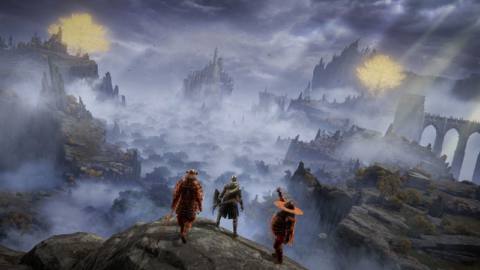
In the closed network test, players explored a small slice of Limgrave and Stormveil. When I went hands-on with the game, all of Limgrave and Stormveil were open to me, including the haunting Weeping Penninsula to the south. But to the north of Stormveil lies another realm, a biome with a completely different aesthetic. Each realm in Elden Ring has its own signature set of creatures, flora, fauna, and more. The big boss of Stormveil, Godrick the Grafted, does not need to be beaten before moving on to the realm to the north, as a mildly hidden mountain path can lead players into this area without ever stepping foot inside the dangerous castle dungeon.
This is the home of the magical academy of Raya Lucaria, and instead of the pastoral greens and rolling fields of Limgrave, it is draped in different shades of blue. I had the least amount of time in this zone for my demo and was only allowed to adventure here for a brief 30 minutes. A half-hour of game time in Elden Ring feels like seconds, so I sped around on Torrent, hoping to take in as much as possible during my brief stay. Crystals adorn everything from the environment to enemies, and a dusty fog hovers over shallow waters that impede movement ever-so-slightly. Deeper into the zone, the waters deepen, and the player must traverse over the submerged tops of buildings as they get closer to the imposing, brilliantly-lit Raya Lucaria.
New enemy types here consist of crystal snails, vicious primates, and massive marine life including giant enemy crabs and lobsters. Different types of turtle warriors roam the waters, and balloons float over the landscape. We still discover caves to explore and some of the same exploratory devices, like an aetherial candle that summons ghosts to follow, that we saw in Limgrave, but everything here feels different. It’s a completely new realm, something conveyed visually and in terms of gameplay – maneuvering around in all the water is a substantially varied experience, leaving me to seek solace in pockets of land. Cleverly, these “islands” also house plenty of important things to find and lead me to several startling mysteries and discoveries.
Upon arrival, my first order of business is to locate a stele stone using the map. When you enter a new area in Elden Ring, you won’t have any sense of where anything is on your trusty map – but by finding clues at these steles, which are marked even in areas that you have yet to explore, you can fill in the essential topography in a zone to help you explore. The map certainly never tells the whole story, but it can help drill down your discoveries as you guide your efforts. Sometimes, it’s cool to just wander aimlessly in a direction to see what you can find, but the map helps identify major landmasses and landmarks.
The trip to Raya Lucaria was halted at the door to this location that’s likely a legacy dungeon since I lacked a critical key. However, just checking out the zone in the brief time I had there was rather awe-inspiring because I’d only really seen the unified vision of the Limgrave/Stormveil area until this point. While Limgrave houses some cool places to explore, like a castle overrun with chimeric beings, magical portals to strange towers, and more, the bold blues and almost tranquil-yet-unnerving arcane, oceanic feel of Raya Lucaria’s home feel like another world entirely. If From Software pulls off this kind of extremely strong world-feel for each definitive slice of The Lands Between, the journey through Elden Ring is going to be something unbelievably special. Check out the full cover story for more details on Raya Lucaria, magical portals, mysterious elevators, Castle Mourne, and more!
